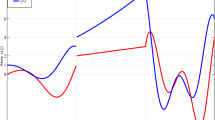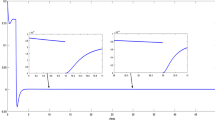Abstract
In this paper, a new integral inequality lemma along with an appropriate Lyapunov–Krasovskii functional (LKF) is proposed for fuzzy time-delay system to enhance the delay upper bound estimate. The proposed lemma is referred to hereafter as Extended Affine Wirtinger inequality. The novelty of the lemma is twofold, it has the ability to integrate uncertain delay information utilizing the convex combination of certain and uncertain delay intervals involved in the proposed LKF, and it is compatible to derive delay-range-dependent (DRD) stability conditions for continuous time Takagi–Sugeno (T–S) fuzzy time-delay system. One noteworthy advantage of the proposed stability condition in a linear matrix inequality (LMI) framework is that it requires less number of matrix variables compared to the existing integral inequalities of the similar type, thus reducing the computational burden too. The efficacy of the proposed DRD stability condition over existing conditions is validated numerically by solving three examples related to fuzzy time-delay system.




Similar content being viewed by others

References
Khalil, H.K., Grizzle, J.W.: Nonlinear Systems. Prentice Hall, Upper Saddle River (1996)
Tanaka, K., Wang, H.O.: Fuzzy Control Systems Design and Analysis: A Linear Matrix Inequality Approach. Wiley, Hoboken (2004)
Takagi, T., Sugeno, M.: Fuzzy identification of systems and its applications to modeling and control. IEEE Trans. Syst. Man Cybern. 15(1), 116–132 (1985)
Boyd, S.P., El Ghaoui, L., Feron, E., Balakrishnan, V.: Linear Matrix Inequalities in System and Control Theory. SIAM, Philadelphia (1994)
Gahinet, P., Nemirovski, A., Laub, A.J., Chilali, M.: LMI Control Toolbox-for Use with Matlab, Natick. The MATH Works, Inc, MA (1995)
Gu, K., Chen, J., Kharitonov, V.L.: Stability of Time-Delay Systems. Birkhauser, Boston (2003)
Parlakçı, M.N.A.: Improved robust stability criteria and design of robust stabilizing controller for uncertain linear time-delay systems. Int. J. Robust Nonlinear Control IFAC-Affil. J. 16(13), 599–636 (2006)
Chen, J., Xu, D., Shafai, B.: On sufficient conditions for stability independent of delay. IEEE Trans. Autom. Control 40(9), 1675–1680 (1995)
He, Y., Wang, Q.G., Xie, L., Lin, C.: Further improvement of free-weighting matrices technique for systems with time-varying delay. IEEE Trans. Autom. Control 52(2), 293–299 (2007)
Dey, R., Martinez Garcia, J.C.: Improved delay-range-dependent stability analysis for uncertain retarded systems based on affine Wirtinger-inequality. Int. J. Robust Nonlinear Control 27(16), 3028–3042 (2017)
Zeng, H.B., He, Y., Wu, M., She, J.: Free-matrix-based integral inequality for stability analysis of systems with time-varying delay. IEEE Trans. Autom. Control 60(10), 2768–2772 (2015)
Seuret, A., Gouaisbaut, F.: Wirtinger-based integral inequality: application to time-delay systems. Automatica 49(9), 2860–2866 (2013)
Gyurkovics, É.: A note on Wirtinger-type integral inequalities for time-delay systems. Automatica 61, 44–46 (2015)
Ji, X., Su, H.: A note on equivalence between two integral inequalities for time-delay systems. Automatica 53, 244–246 (2015)
Park, P., Ko, J.W., Jeong, C.: Reciprocally convex approach to stability of systems with time-varying delays. Automatica 47(1), 235–238 (2011)
Dey, R., Ghosh, S., Ray, G., Rakshit, A., Balas, V.E.: Improved delay-range-dependent stability analysis of a time-delay system with norm bounded uncertainty. ISA Trans. 58, 50–57 (2015)
Sun, J., Liu, G., Chen, J., Rees, D.: Improved delay-range-dependent stability criteria for linear systems with time-varying delays. Automatica 46(2), 466–470 (2010)
Dey, R., Ghosh, S., Ray, G., Rakshit, A.: State feedback stabilization of uncertain linear time-delay systems: a nonlinear matrix inequality approach. Numer. Linear Algebra Appl. 18(3), 351–361 (2011)
Dey, R., Ghosh, S., Ray, G., Rakshit, A.: Improved delay-dependent stabilization of time-delay systems with actuator saturation. Int. J. Robust Nonlinear Control 24(5), 902–917 (2014)
Datta, R., Bhattacharya, B., Chakrabarti, A.: On improved delay-range-dependent stability condition for linear systems with time-varying delay via Wirtinger inequality. Int. J. Dyn. Control 6(4), 1745–1754 (2018)
Dey, R., Ghosh, S., Gyurkovics, E., Ray, G.: Delay-interval-dependent stability criterion for linear systems with time-varying state delay. IFAC-PapersOnLine 48(14), 120–125 (2015)
Wu, H.N., Li, H.X.: New approach to delay-dependent stability analysis and stabilization for continuous-time fuzzy systems with time-varying delay. IEEE Trans. Fuzzy Syst. 15(3), 482–493 (2007)
Liu, F., Wu, M., He, Y., Yokoyama, R.: New delay-dependent stability criteria for T–S fuzzy systems with time-varying delay. Fuzzy Sets Syst. 161(15), 2033–2042 (2010)
An, J., Li, T., Wen, G., Li, R.: New stability conditions for uncertain T–S fuzzy systems with interval time-varying delay. Int. J. Control Autom. Syst. 10(3), 490–497 (2012)
An, J., Wen, G.: Improved stability criteria for time-varying delayed T–S fuzzy systems via delay partitioning approach. Fuzzy Sets Syst. 185(1), 83–94 (2011)
Chen, B., Liu, X., Tong, S.: New delay-dependent stabilization conditions of T–S fuzzy systems with constant delay. Fuzzy sets Syst. 158(20), 2209–2224 (2007)
Souza, F.O., Campos, V., Palhares, R.M.: On delay-dependent stability conditions for Takagi–Sugeno fuzzy systems. J. Franklin Inst. 351(7), 3707–3718 (2014)
Datta, R., Dey, R., Bhattacharya, B., Chakrabarti, A.: Improved stability condition for fuzzy systems with interval time-varying delay. In IEEE Joint 17th World Congress of IFSA and 9th International Conference on SCIS, Japan, pp. 1–6 (2017)
Zhang, Z., Lin, C., Chen, B.: New stability and stabilization conditions for T–S fuzzy systems with time delay. Fuzzy Sets Syst. 263, 82–91 (2015)
Feng, Z., Zheng, W.X.: Improved stability condition for Takagi–Sugeno fuzzy systems with time-varying delay. IEEE Trans. Cybern. 47(3), 661–670 (2017)
Kwon, O.M., Park, M.J., Lee, S.M., Park, J.H.: Augmented Lyapunov–Krasovskii functional approaches to robust stability criteria for uncertain Takagi–Sugeno fuzzy systems with time-varying delays. Fuzzy Sets Syst. 201, 1–19 (2012)
Lian, Z., He, Y., Zhang, C.K., Wu, M.: Stability analysis for T–S fuzzy systems with time-varying delay via free-matrix-based integral inequality. Int. J. Control Autom. Syst. 14(1), 21–28 (2016)
Ma, Y., Chen, M.: Delay-dependent robust dissipative filter for T–S fuzzy descriptor time-varying delay systems. J. Control Autom. Electr. Syst. 26(5), 476–483 (2015)
Peng, C., Han, Q.L.: Delay-range-dependent robust stabilization for uncertain T–S fuzzy control systems with interval time-varying delays. Inf. Sci. 181(19), 4287–4299 (2011)
Peng, C., Wen, L.Y., Yang, J.Q.: On Delay-dependent robust stability criteria for uncertain T–S fuzzy systems with interval time-varying delay. Int. J. Fuzzy Syst. 13(1), 35–44 (2011)
Bourahala, F., Guelton, K., Manamanni, N., Khaber, F.: Relaxed controller design conditions for Takagi–Sugeno systems with state time-varying delays. Int. J. Fuzzy Syst. 19(5), 1406–1416 (2017)
Che, C., Peng, J., Xiao, J., Zhao, T., Zhou, J.: Membership-function-dependent stabilization conditions for interval type-2 fuzzy time-delay systems via static output feedback scheme. Int. J. Fuzzy Syst. 20(5), 1439–1450 (2018)
Ammar, I.I., Gassara, H., El Hajjaji, A., Chaabane, M.: New polynomial Lyapunov functional approach to observer-based control for polynomial fuzzy systems with time delay. Int. J. Fuzzy Syst. 20(4), 1057–1068 (2018)
Zeng, H.B., Park, J.H., Xia, J.W., Xiao, S.P.: Improved delay-dependent stability criteria for T–S fuzzy systems with time-varying delay. Appl. Math. Comput. 235, 492–501 (2014)
Gassara, H., El Hajjaji, A., Krid, M., Chaabane, M.: Stability analysis and memory control design of polynomial fuzzy systems with time delay via polynomial Lyapunov–Krasovskii functional. Int. J. Control Automat. Syst. 16(4), 2011–2020 (2018)
Rong, N., Wang, Z., Ding, S., Zhang, H.: Interval type-2 regional switching T–S fuzzy control for time-delay systems via membership function dependent approach. Fuzzy Sets Syst. (2018). https://doi.org/10.1016/j.fss.2018.10.014
Wang, Y., Xia, Y., Zhou, P.: Fuzzy-model-based sampled-data control of chaotic systems: a fuzzy time-dependent Lyapunov–Krasovskii functional approach. IEEE Trans. Fuzzy Syst. 25(6), 1672–1684 (2017)
Tan, J., Dian, S., Zhao, T., Chen, L.: Stability and stabilization of T–S fuzzy systems with time delay via Wirtinger-based double integral inequality. Neurocomputing 275, 1063–1071 (2018)
Zhao, L., Gao, H., Karimi, H.R.: Robust stability and stabilization of uncertain T–S fuzzy systems with time-varying delay: an input-output approach. IEEE Trans. Fuzzy Syst. 21(5), 883–897 (2013)
Benzaouia, A., El Hajjaji, A.: Conditions of stabilization of positive continuous Takagi–Sugeno fuzzy systems with delay. Int. J. Fuzzy Syst. 20(3), 750–758 (2018)
Yang, Z., Zhang, H.: Stability and \(L_1\)-gain analysis for switched positive T–S fuzzy systems with time-varying delay. Int. J. Fuzzy Syst. 20(2), 380–389 (2018)
Liu, J.C.: A generalized probability-interval-decomposition approach for stability analysis of T–S fuzzy systems with stochastic delays. J. Franklin Inst. 355(3), 1373–1393 (2018)
Wang, B., Cheng, J., Al-Barakati, A., Fardoun, H.M.: A mismatched membership function approach to sampled-data stabilization for T–S fuzzy systems with time-varying delayed signals. Signal Process. 140, 161–170 (2017)
Tan, J., Dian, S., Zhao, T.: Further studies on stability and stabilization of T–S fuzzy systems with time-varying delays via fuzzy Lyapunov–Krasovskii functional method. Asian J. Control 20(6), 2207–2222 (2018)
Wang, L., Lam, H.K.: New stability criterion for continuous-time Takagi–Sugeno fuzzy systems with time-varying delay. IEEE Trans. Cybern. 99, 1–6 (2018)
Peng, C., Fei, M.R.: An improved result on the stability of uncertain T–S fuzzy systems with interval time-varying delay. Fuzzy Sets Syst. 212, 97–109 (2013)
Wang, L., Lam, H.K.: A new approach to stability and stabilization analysis for continuous-time Takagi–Sugeno fuzzy systems with time delay. IEEE Trans. Fuzzy Syst. 26(4), 2460–2465 (2018)
Li, M., Shu, F., Liu, D., Zhong, S.: Robust \(\text{ H }_{\infty }\) control of T–S fuzzy systems with input time-varying delays: a delay partitioning method. Appl. Math. Comput. 321, 209–222 (2018)
Tian, E., Yue, D., Zhang, Y.: Delay-dependent robust \(\text{ H }_{\infty }\) control for T–S fuzzy system with interval time-varying delay. Fuzzy Sets Syst. 160(12), 1708–1719 (2009)
Zhang, Z., Li, A., Yu, S.: Finite-time synchronization for delayed complex-valued neural networks via integrating inequality method. Neurocomputing 318, 248–260 (2018)
Zhang, Z., Cao, J.: Novel finite-time synchronization criteria for inertial neural networks with time delays via integral inequality method. IEEE Trans. Neural Netw. Learn. Syst. (2018). https://doi.org/10.1109/TNNLS.2018.2868800
Author information
Authors and Affiliations
Corresponding author
Appendix 1
Appendix 1
Proof of Lemma 3:
Based on Schur’s complement, for positive definite symmetric matrix R and free matrices \(N_{1},\,N_{2},\,N_{3},\,N_{4}\) with appropriate dimension, the following inequality holds
which implies that
where \(\vartheta _{1},\,\vartheta _{2}\) are any vectors. Next, for the function \(\gamma (s,a,b)=\dfrac{2s-b-a}{b-a}\), the following integration is calculated as
Define the vectors \(\vartheta _{1}\) and \(\vartheta _{2}\) as follows
Thus, recalculating (48) based on the above definitions, yields
Using the concept of convex combination of LMIs in [21] and doing some algebraic manipulation, (53) can be written as
where \(\alpha _{1}=\dfrac{c(t)-a}{h},\,h=(b-a)\). This complete the proof of Lemma 3. \(\square\)
Rights and permissions
About this article
Cite this article
Datta, R., Dey, R. & Bhattacharya, B. Improved Delay-Range-Dependent Stability Condition for T–S Fuzzy Systems with Variable Delays Using New Extended Affine Wirtinger Inequality. Int. J. Fuzzy Syst. 22, 985–998 (2020). https://doi.org/10.1007/s40815-019-00795-8
Received:
Revised:
Accepted:
Published:
Issue Date:
DOI: https://doi.org/10.1007/s40815-019-00795-8



